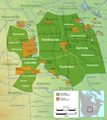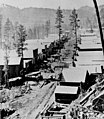Portal:South Dakota
The South Dakota Portal South Dakota (/dəˈkoʊtə/ ; Sioux: Dakȟóta itókaga, pronounced [daˈkˣota iˈtokaga]) is a landlocked state in the North Central region of the United States. It is also part of the Great Plains. South Dakota is named after the Dakota Sioux tribe, which comprises a large portion of the population — with nine reservations currently in the state — and has historically dominated the territory. South Dakota is the 17th-largest by area, but the fifth-least populous, and the fifth-least densely populated of the 50 United States. Pierre is the state capital, and Sioux Falls, with a population of about 213,900, is South Dakota's most populous city. The state is bisected by the Missouri River, dividing South Dakota into two geographically and socially distinct halves, known to residents as "East River" and "West River". South Dakota is bordered by North Dakota to the north, Minnesota to the east, Iowa to the southeast, Nebraska to the south, Wyoming to the west, and Montana to the northwest. Humans have inhabited the area for several millennia, with the Sioux becoming dominant by the early 19th century. In the late 19th century, European-American settlement intensified after a gold rush in the Black Hills and the construction of railroads from the east. Encroaching miners and settlers triggered a number of Indian wars, ending with the Wounded Knee Massacre in 1890. As the southern part of the former Dakota Territory, South Dakota became a state on November 2, 1889, simultaneously with North Dakota. They are the 39th and 40th states admitted to the union; President Benjamin Harrison shuffled the statehood papers before signing them so that no one could tell which became a state first. Key events in the 20th century included the Dust Bowl and Great Depression, increased federal spending during the 1940s and 1950s for agriculture and defense, and an industrialization of agriculture that has reduced family farming. Eastern South Dakota is home to most of the state's population, and the area's fertile soil is used to grow a variety of crops. West of the Missouri River, ranching is the predominant agricultural activity, and the economy is more dependent on tourism and defense spending. Most of the Native American reservations are in West River. The Black Hills, a group of low pine-covered mountains sacred to the Sioux, is in the southwest part of the state. Mount Rushmore, a major tourist destination, is there. South Dakota has a temperate continental climate, with four distinct seasons and precipitation levels ranging from moderate in the east to semi-arid in the west. The state's ecology features species typical of a North American grassland biome. (Full article...) Selected article -Thomas John Brokaw (/ˈbroʊkɔː/; born February 6, 1940) is an American retired network television journalist and author. He first served as the co-anchor of The Today Show from 1976 to 1981 with Jane Pauley, then as the anchor and managing editor of NBC Nightly News for 22 years (1982–2004). In the previous decade he served as a weekend anchor for the program from 1973 to 1976. He is the only person to have hosted all three major NBC News programs: The Today Show, NBC Nightly News, and, briefly, Meet the Press. He formerly held a special correspondent post for NBC News. Along with his competitors Peter Jennings at ABC News, and Dan Rather at CBS News, Brokaw was one of the "Big Three" U.S. news anchors during the 1980s, 1990s and early 2000s. All three hosted their networks' flagship nightly news programs for more than 20 years. (Full article...) CategoriesRelated portalsEntries here consist of Good and Featured articles, which meet a core set of high editorial standards.
Ex parte Crow Dog, 109 U.S. 556 (1883), is a landmark decision of the Supreme Court of the United States that followed the death of one member of a Native American tribe at the hands of another on reservation land. Crow Dog was a member of the Brulé band of the Lakota Sioux. On August 5, 1881 he shot and killed Spotted Tail, a Lakota chief; there are different accounts of the background to the killing. The tribal council dealt with the incident according to Sioux tradition, and Crow Dog paid restitution to the dead man's family. However, the U.S. authorities then prosecuted Crow Dog for murder in a federal court. He was found guilty and sentenced to hang. The defendant then petitioned the Supreme Court for a writ of habeas corpus, arguing that the federal court had no jurisdiction to try cases where the offense had already been tried by the tribal council. The court found unanimously for the plaintiff and Crow Dog was therefore released. This case was the first time in history that an Indian was held on trial for the murder of another Indian. The case led to the Major Crimes Act in 1885, which placed some major crimes (initially seven, now 15) under federal jurisdiction if committed by an Indian against another Indian on a reservation or tribal land. This case was the beginning of the plenary power legal doctrine that has been used in Indian case law to limit tribal sovereignty. (Full article...) General images -The following are images from various South Dakota-related articles on Wikipedia.
Did you know -
TopicsLargest citiesCities in South Dakota, with their populations (as of July 1, 2020, as enumerated by the 2020 United States census):
WikiProjectsNew articlesThis list was generated from these rules. Questions and feedback are always welcome! The search is being run daily with the most recent ~14 days of results. Note: Some articles may not be relevant to this project.
Rules | Match log | Results page (for watching) | Last updated: 2024-11-22 22:20 (UTC) Note: The list display can now be customized by each user. See List display personalization for details.
Associated WikimediaThe following Wikimedia Foundation sister projects provide more on this subject:
Sources
|





















